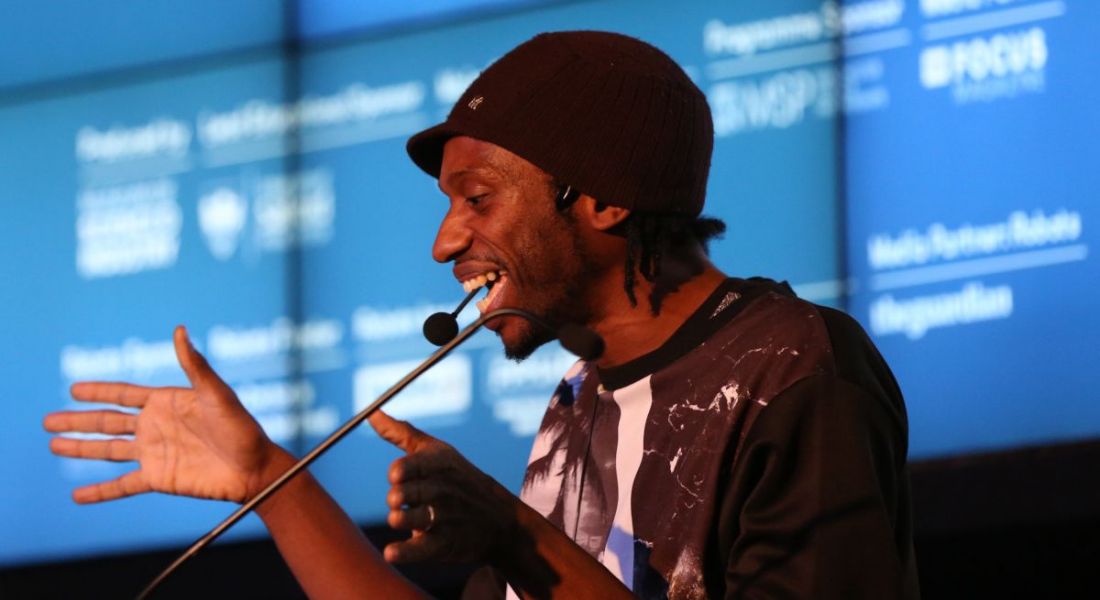‘Sometimes you can meet people where they are and then show them the science to that,’ Jon Chase said of his approach to science communication.
Jon Chase is best known as a science rapper, but he does a lot of other things too. To be fair, ‘science rapper’ is certainly a job title that might make a lot of people smile or scratch their heads initially.
But Chase is an academic, a communicator, a performer, a writer and a bit of a polymath in general. When he describes the evolution of his varied career, he makes it sound very easy – almost like freestyle.
He spoke to SiliconRepublic.com from his temporary base in Leiden in the Netherlands, where he is working on a project that seeks to understand science communication on a global perspective. For his part in the EU-funded GlobalScape project, Chase is producing a science communication module that will eventually be available for free via open access for all science communicators.
It will serve as a training module to engage what Chase calls the “lesser heard” voices in this space. Generally, science communication is about increasing the reach of science and engaging a broader part of society. However, as a performer and a storyteller, Chase is also keenly aware of the need to target specific audiences.
He got into science rapping initially with the intention of encouraging rap fans to appreciate science. But it was a mix of serendipity and skill that got him to the point he’s at today.
“I was doing a master’s in science communication and I showed my professor a rap I’d written about science and science communication, based on the stuff I’ve been learning in the course, and he liked it,” Chase explained.
“We were on our way to an astrobiology conference and he told a lady, ‘Oh, Jon raps about science.’ And so she asked me to do one for her organisation, and that was a NASA astrobiology magazine. They ended up putting my rap and video on their website and then it took off. It went on the news. And then it took off again, and officially, I was a science rapper.”
‘I’m really trying to change perspectives on all levels. What does it mean to be someone who’s interested in science? Do you have to look a particular way? Do you have to do science in a particular way or do you have to talk about in a particular way?’
– JON CHASE
Prior to his degree in science communication, Chase had studied aerospace engineering.
He also studied science and science fiction, stemming from a fascination with flying cars, which taught him that science communication doesn’t necessarily have to be “dry”. Communicating science to young people or people with a non-scientific background works best when their imaginations and emotions are engaged, he found.
“Let’s be fair, most things in the world are created through the imagination first, and science fiction and fiction often gets there first,” Chase said, referring to the subject of flying cars and other hallmarks of sci-fi novels and films.
“Sometimes you can meet people where they are and then show them the science to that – whether it’s through art, whether it’s through dance, whether it’s through just walking down the street.”
Chase has done shows and books exploring the science of popular fiction from the movies (Jurassic Park, Star Wars) to literature (James and the Giant Peach, Harry Potter). The shows came first, before he was invited to write books by a professor who told him he had a knack for writing. His raps have also appeared on the BBC in his native UK.
Does he think there’s a correlation between science communication and performance? Yes, he said, because the success of the message of both depends on the audience and how they receive it and respond to it.
People vary between cultures, time of day and so many other things, he explained. “How you catch them on a Monday may differ from a Friday; you catch them after they’ve been for a jog, they’re different from before they went for that jog.”
People’s responses clearly interest Chase, not just as a performer, but as an academic. He has discovered that an unintended – albeit not unappreciated – consequence of his science raps has been encouraging academics to change their perspectives on rap and how science can be communicated.
He recalled an occasion at an academic conference on astrobiology when he was called upon to perform a rap.
“So they’re there to talk about astrobiology, these scientists from around the world, and then on a break they called me in and said, ‘Hey, Jon, could you do an astrobiology rap for this group?’. And I said OK. It was a surprise, it wasn’t on the bill.”
Chase walked in wearing a T-shirt to face a crowd of “hard academics”, some of whom were “sat there covering their faces” not knowing what to expect. He greeted them and launched into his rap about astrobiology, cringing internally at the nonplussed row of faces.
“I was name-dropping all the things they were familiar with, and halfway through I named some of the scientists in the room because they just weren’t getting into the rap.”
Gradually, he saw their hands slide away from their faces. By the end, he got a standing ovation.
“So the initial thought and idea of it caused some of them to cringe, but by the end, they appreciated it,” Chase said, “And so I’d say that from the academic community was a riotous success.”
“I’m really trying to change perspectives on all levels,” he added. “What does it mean to be someone who’s interested in science? Do you have to look a particular way? Do you have to do science in a particular way or do you have to talk about in a particular way? It’s about broadening perspectives and finding new approaches to things.”
Broadening perspectives is a big focus of the GlobalScape project. According to Chase, English is the language of science communication globally. For those who don’t speak English or have access to funding, it can be difficult to tell the world about their work. Most non-English speaking scientists publish in English anyway as their work would not reach a large international audience otherwise.
Chase and his fellow researchers did a year-long study speaking to other science communicators every week, encouraging them “to comment on their experiences in science communication, that week, their feelings, their challenges” in order to gain a broad picture of the changes in views and experiences of science communicators over the course of year all over the globe.
This week, Chase will take his expertise to the European Science Engagement Conference 2022, which will be held in Munster Technological University on 6 and 7 July, giving one of the keynote addresses.
Fittingly, the event’s theme is ‘Let’s co-create the future’ – exactly what Chase is setting out to do by bringing the joys of both science and rap to more and more people.
10 things you need to know direct to your inbox every weekday. Sign up for the Daily Brief, Silicon Republic’s digest of essential sci-tech news.




